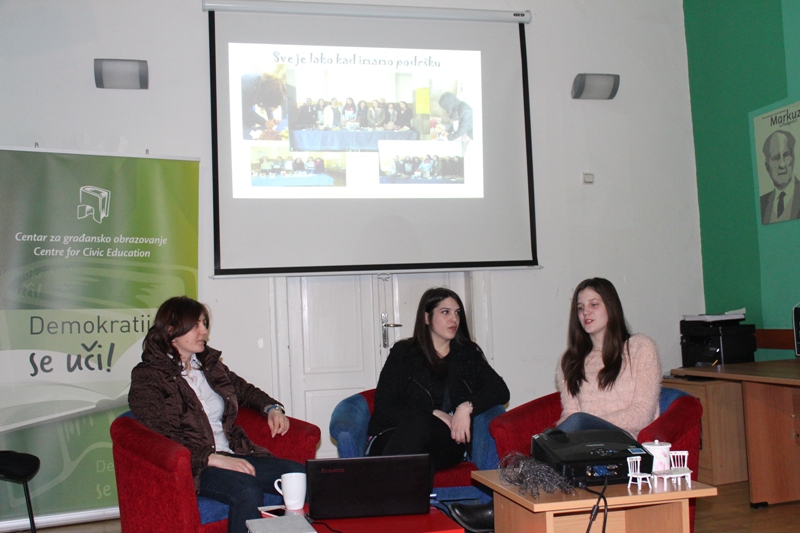Centre for Civic Education (CCE) organised a panel discussion in cooperation with entrepreneurial club of high school “Slobodan Škerović” – ,,Wire” titled European Framework of Key Competences for Life-Long Learning – significance and challenges in the education of young people for entrepreneurial culture in Montenegro.
Numerous researches indicate that very few people have certain level of entrepreneurial intelligence in their nature, while a very positive correlation is evident between the entrepreneurial education and the improvement of entrepreneurial skills and culture. From this point of view, entrepreneurial education plays an important role as a propellant of social changes and development.
Every European state, whether EU member state or one in the process of integration, has to work on the establishment of European framework of key competences on its path to society of knowledge, which guarantees economic growth and development, as well as the sustainability, whereby the role of entrepreneurship is of special significance. Participants of panel discussion concluded that both entrepreneurial culture and skills have to be developed by the end of mandatory education, which should make the basis for future education as part of the life-long learning.
In Montenegro, entrepreneurial education is present in elementary school as a cross-curricular topic of discussion, but also in the education for sustainable development, while in secondary education, entrepreneurship is offered in the form of an elective course. During the secondary vocational education, entrepreneurial education makes the integral part in the education on vocational subjects.
Support of society for entrepreneurial initiatives in Montenegro is still on a low level, starting from the lack of interest by private companies and business sector to support the activities of entrepreneurial clubs, and a frequent lack of attention by the media, which should play an important role in the promotion of entrepreneurial culture. Panel discussion participants concluded that schools still lack the sufficient technical equipment, as well as the spatial possibilities which would facilitate the work of entrepreneurial clubs, even though the schools in which those clubs act tend to provide the basic conditions. They assessed that this subject should be treated as mandatory since its importance is far greater and it should not be ranked among elective courses. Apathy of young people and their lack of will to change anything in their environment are also some of the issues we need to work on and this is where entrepreneurial knowledge can provide a significant contribution.
What was particularly emphasised during the panel was the need to develop entrepreneurial values which could only refine the skills and knowledge on the path to preservation and respect of the principle of sustainable development which embodies the preservation of both natural and human resources along with full respect of human rights.
As an example of good practice of education on entrepreneurial culture, they presented the work of Entrepreneurial club of high school “Slobodan Škerović” titled “Wire”, conducted under the tutorship of coordinator and professor Milena Pajović, which ranked on 7th position among 49 other clubs on a recently completed European competition in Slovenia. During the panel, she, along with the members of entrepreneurial club Marija Boljević and Jovana Nedović, presented the experience from working in entrepreneurial club, participation on the fair, and stressed out the importance of connecting and exchanging young entrepreneurs with peers from other European states. They also presented part of the product of their work and some of the numerous successful actions which were implemented in their school.
Petar Đukanović, Programme coordinator, briefly presented the programme Europe for citizens as an opportunity for schools to secure the funds necessary to promote different aspects of education and topics that are relevant in European frameworks, whereby entrepreneurship is of special importance.
Panel discussion is part of the activities of project Homoeuropeanus – Overcoming the Knowledge Deficit on EU, conducted by the CCE in partnership with 14 European organisations. Objective of project is to improve the level of knowledge on EU in times of challenges caused by economic and migrant crisis and xenophobia, and motivate the citizens to take an active participation in social and political life which should help overcome the long-diagnosed problem of union i.e. democratic deficit.
Svetlana Pešić, Programme associate

